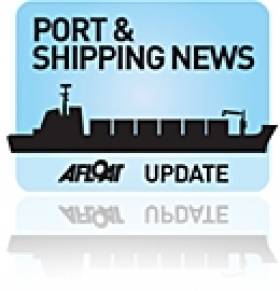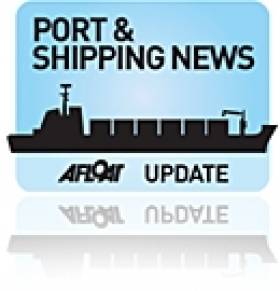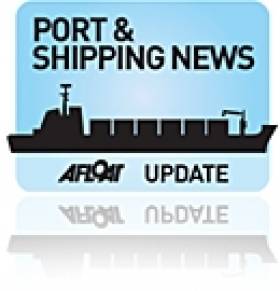Displaying items by tag: Irish ports and shipping news
Arklow Vessel Sets Record Cargo for Drogheda Port
#PORTS & SHIPPING – Drogheda Port set a record tonnage cargo with the arrival of Arklow Bridge (2011/4,723grt) last week. The vessel operated by Arklow Shipping N.V. as previously reported on Afloat.ie had carried 7,125 tonnes of maize, the largest ever single cargo handled in the Co. Louth port, writes Jehan Ashmore.
Arklow Bridge is the second 'B' class vessel that was built last year and the Dutch-flagged vessel loaded the cargo of maize in the Polish city of Gdynia for Comex McKinnon. The company is a leading player in the importation and trading of feedstuffs for the animal feed sector in Ireland.
Stevedoring services were handled by Fast Terminals, a new company which is a joint venture between Drogheda Port Company and Fast Shipping of Antwerp. The company became operational last Septemberand increases the number of stevedoring operations in the port to four.
Drogheda Port is developing its agri-sector business so to transport feedstuffs for the animal feed sector in Ireland. The agri-food sector is worth €7.8bn and is proving resilient, despite the downturn and growth from this indigenous sector will be vital to the country's overall economic recovery.
According to Drogheda Port Company, planning permission was recently received for the development of a 5,400sq m bulk storage facility at the Tom Roes Point Terminal. The downriver facility is situated closer to the open sea compared to the towns quays on the banks of the Boyne.
Mr Paul Fleming, Drogheda Port Chief Executive said "Drogheda Port continues to provide a strategic import and export location for our customers with a service which is more flexible and cost competitive than other larger ports".
He added: "This is helping us to win new contracts and grow our business in addition to providing a platform to Ireland's importers and exporters to reach their markets more cost competitively."
Mr Simon Mulvany, Director of Fast Terminals said "Fast Terminals has identified the competitive opportunities that Drogheda Port can offer our company. Despite the current economic downturn we intend to invest in the port and develop our facilities to cater for further growth in the future."
Port & Shipping Volumes Continue Slowdown in 3rd Quarter
#PORTS & SHIPPING- The volume of shipping and port traffic through the Republic of Ireland continued to decline during the third quarter of 2011, according to the latest analysis of traffic figures released by the Irish Maritime Development Office (IMDO).
Results from third quarter data indicate that only 1 of the 5 principal freight segments had any growth over the third quarter, while all other segments declined compared to the same period last year as outlined below in the key third quarter data:-
• Lift-on/Lift-off (lo/lo) trades were down 5%
• Roll-on/Roll-off export traffic was down by 2%
• Dry bulk volumes increased by 2%
• Break bulk volumes were down by 3%
• The Tanker/Liquid bulk market was down 7%.
For a more in-depth analysis of each freight-transport mode issued by the IMDO and accompanied by graphic charts click HERE. In addition to compare the 3rd quarter figures with the previous 2nd quater for this year click HERE.
Port and Shipping Volumes Show Second Quarter Slowdown
Below is a list of figures for each transport mode based for the second quarter of 2011.
•Lift-on/Lift-off (lo/lo) trades remained static at 0%.
•Roll-on/Roll-off (ro/ro) export traffic was down by 1%.
•Dry bulk volumes increased by 5%,
•Break bulk volumes were down by 6%
•The Tanker/Liquid bulk market was down 6%.
For more in-depth analysis of each freight-transport mode issued by the IMDO and accompanied by graphic charts click HERE.


























































